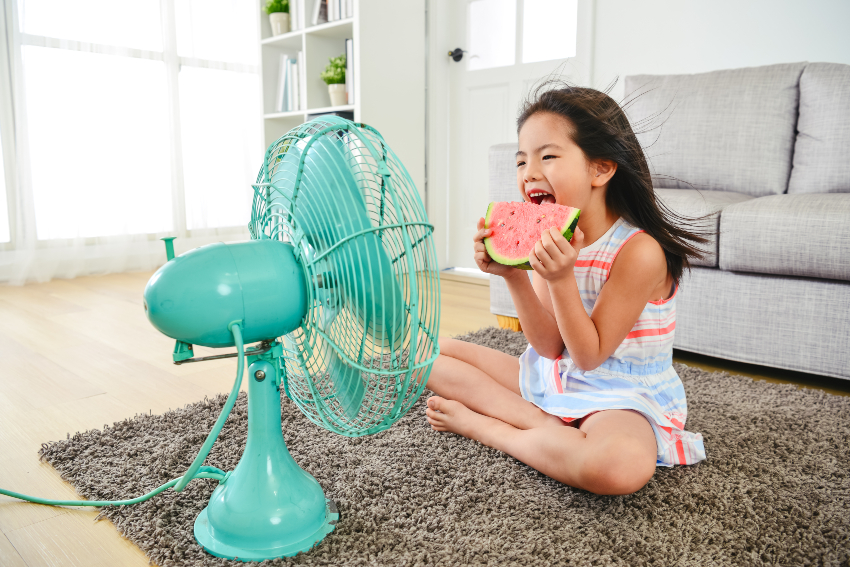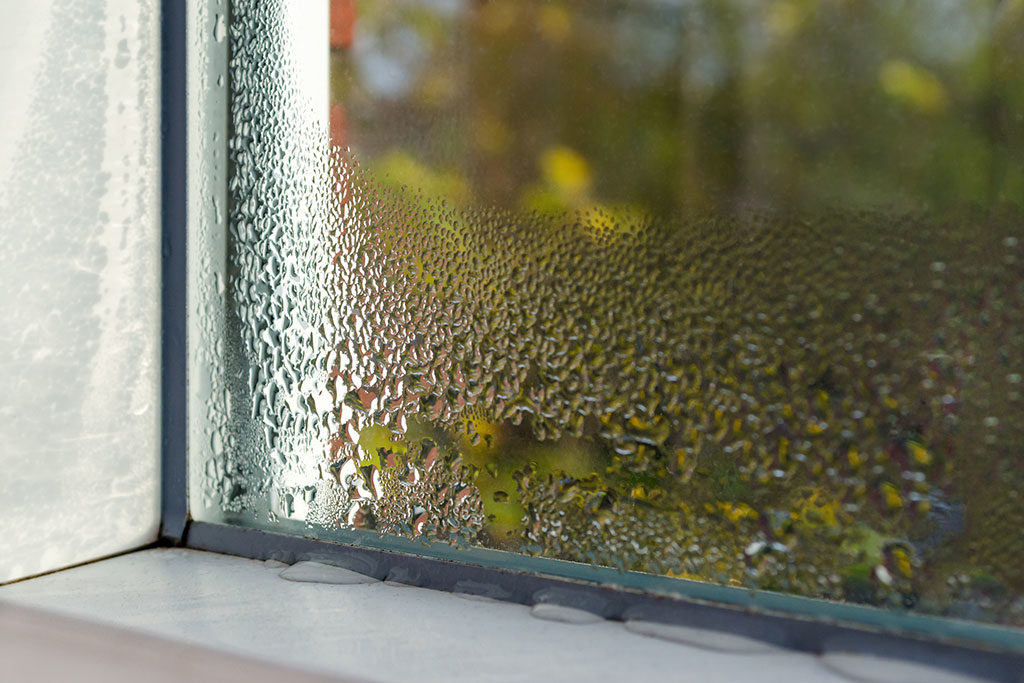Get a Handle on Home Humidity
Posted on by WestAIR Heating & Cooling

Around this time last year, we wrote about surprising ways to reduce humidity in your home. We hope some of those tips proved helpful. With the recent summer rain, heat, and excess moisture, we thought now would be an ideal time to revisit the issue to help you get a handle on home humidity.
Humidity levels
Humidity is the amount of moisture in the air around you. During the summer, humidity levels in your home should measure between 30-50 percent. Humidity levels that are too high or too low can lead to issues with your comfort, health, and home.
Too much humidity prevents the body from regulating its internal temperature, making you and your family feel sticky and uncomfortable. Excess moisture also promotes mold, fungus, and dust mites, which can wreak havoc on allergies and make you sick. Over time, dampness within the home can warp floorboards or furniture and cause wood to rot, resulting in costly repairs.
Conversely, too little humidity causes skin to feel itchy and can dry out the body’s mucous membranes, leading to sore throats, coughing, and nosebleeds. Dryness affects your home, too, when door frames or other features or furnishings made from wood begin to crack, shrink, or bend.
Poor humidity? Here’s how to tell
Establishing a comfortable home environment relies on finding an appropriate balance of air moisture. How do you know if your home humidity levels are out of whack? Look for indicators such as:
- Condensation. Water beads are visible on the inside of the windows.
- Constant sweating. You experience persistent perspiration, even after taking a cool shower.
- Musty smells. You may not be able to see mold and mildew, but you can smell it.
- Difficulty sleeping. Excess moisture makes the body work harder to cool itself, which can be a challenge when you’re trying to fall or stay asleep.
- Water spots. Watch for stains on the walls, ceilings, or basement floor, especially after or during a rain shower.
- Trouble breathing. High humidity can trigger allergies and asthma symptoms.
Regulating home humidity
Summer is sticking around for a bit longer, so make sure you’re enjoying the tail end of the season by staying cool and dry at home. Here are some reminders for keeping home humidity levels low.
- Use exhaust and ventilation fans in the kitchen and bathroom. Leave those fans on for a short while after you’ve finished cooking or showering to ventilate humid air.
- Take advantage of your air conditioner. Your A/C unit brings in cooler air while expelling warmer, humid air.
- Take shorter, cooler showers. The less hot water you use, the less steam and humidity build up in the air.
- Check your gutters. Keep them free from debris to avoid water buildup and indoor leaks. Also, be sure the downspout is positioned away from your home.
- Consider investing in a dehumidifier. These portable appliances or whole home systems can help remove moisture from the air.
The experts at WestAIR Heating & Cooling are here to discuss your home humidity concerns and needs. Our technicians can explain how our high-efficiency air conditioners or air quality accessories can help you stay cool and achieve optimum indoor air quality throughout the summer. Contact us today to schedule service.
This entry was posted in Cooling,Humidity,Indoor Air Quality and tagged Air conditioner, Air quality, Air quality accessories, Humidity, humidity levels, Indoor humidity, regulating humidity
Surprising Ways to Reduce Humidity in Your Home
Posted on by WestAIR Heating & Cooling

If you’ve been noticing foggy windows, musty odors, or clammy air throughout your home, chances are, your humidity levels are high. Humidity can both rob you of comfort and threaten your health. We don’t want you to suffer through the stifling heat, so we’ve outlined some surprising ways to reduce humidity in your home.
But first, a word about relative humidity (RH): RH measures water vapor relative to the temperature of the air. RH illustrates the amount of water in the air in relation to the total amount of humidity that could be held at the current temperature. Weather forecasts report relative humidity because it affects how we feel the temperature. Humid air feels warmer; dry air feels cooler. The ideal indoor relative humidity for a home is between 40 and 60 percent. If your RH is lower or higher, follow these tips:
Go old school with laundry
Dry your clothing outside. If you hang wet clothing inside to dry, all the moisture will evaporate into the air.
Accessorize with plants
Invest in some household tropical plants like Boston ferns, English ivies, Peace lilies, Reed Palms, or Tillandsias. These plants absorb moisture from the air instead of through the roots.
Take cold(er) showers
Hot showers create steam. Plan to bathe after exercising or spending time outside in the heat. You’ll be less tempted to jump into a steaming shower, and the cool water will feel refreshing. If nothing else, run the exhaust fan during and after showering.
Eat more salads
Hot weather provides the perfect opportunity to cook outside on the grill or eat cold meals like salads and sandwiches. Avoid boiling water; instead, save the heavy pasta for cooler weather. Your body will thank you in more ways than one.
Check the drainage route
In high humidity, your air conditioner or dehumidifier will produce a lot of condensation that has to go somewhere. Regularly empty the drip pan and be sure the drain lines are working properly so the water doesn’t evaporate back into the air.
Replace your flooring
Carpet is known to retain moisture. If you’ve tried all the above methods to decrease humidity, but still have a problem with moisture, consider replacing the carpet with hardwood flooring.
Benefits of proper humidity
With lower humidity levels, you could raise the thermostat setting a few degrees and still be comfortable. High humidity may cause headaches and asthma symptoms such as wheezing, shortness of breath, or a chronic cough. Proper humidity levels are easier on your respiratory tract and can:
- Reduce your cooling costs.
- Minimize wear on your HVAC system.
- Prevent dust mites, mold, bacteria, and mildew.
- Eliminate foul odors.
- Help you sleep better.
If you are still having trouble, consult with the professionals at WestAIR Heating & Cooling. We offer high-efficiency air conditioners to keep you cool in the muggy season and countless air quality accessories to reduce humidity. Schedule service to have a technician visit your home and recommend the right solutions for your family’s total indoor air comfort.
Contact us for more information.
This entry was posted in Air Conditioning,Cooling,Health Tips,Indoor Air Quality,Tips and tagged Air quality accessories, Asthma, Comfortable, Cooling, Dehumidifier, Energy efficiency, Energy savings, Grilling out, Humidity, HVAC, HVAC tips, Indoor air, Indoor air quality, Indoor air quality solutions, Muggy season
Subscribe to Our Blog
With RSS feeds, you don't have to visit our site everyday to keep up to date. Simply subscribe to our blog via RSS or Email and our posts will come to you!
Search Blog Posts
Categories
Archives
- April 2024 (1)
- February 2024 (1)
- January 2024 (1)
- February 2023 (1)
- January 2023 (1)
- December 2022 (1)
- November 2022 (1)
- October 2022 (1)
- September 2022 (1)
- August 2022 (1)
- July 2022 (1)
- June 2022 (1)
- May 2022 (1)
- April 2022 (1)
- March 2022 (1)
- February 2022 (2)
- December 2021 (1)
- November 2021 (1)
- October 2021 (1)
- September 2021 (1)
- August 2021 (1)
- July 2021 (1)
- June 2021 (1)
- May 2021 (1)
- April 2021 (1)
- March 2021 (2)
- January 2021 (1)
- December 2020 (1)
- November 2020 (1)
- October 2020 (1)
- September 2020 (1)
- August 2020 (1)
- July 2020 (1)
- June 2020 (1)
- May 2020 (1)
- April 2020 (1)
- March 2020 (1)
- February 2020 (2)
- November 2019 (1)
- August 2019 (2)
- June 2019 (1)
- May 2019 (1)
- April 2019 (1)
- March 2019 (1)
- February 2019 (1)
- January 2019 (1)
- December 2018 (1)
- November 2018 (1)
- October 2018 (1)
- September 2018 (1)
- August 2018 (2)
- July 2018 (1)
- May 2018 (1)
- April 2018 (1)
- March 2018 (1)
- February 2018 (1)
- January 2018 (1)
- December 2017 (3)
- November 2017 (2)
- October 2017 (2)
- September 2017 (2)
- August 2017 (1)
- July 2017 (2)
- June 2017 (3)
- May 2017 (2)
- January 2017 (4)
- November 2016 (1)
- September 2016 (3)
- July 2016 (2)
- June 2016 (2)
- May 2016 (4)
- April 2016 (1)
- March 2016 (2)
- February 2016 (2)
- January 2016 (1)
- August 2015 (1)
- July 2015 (1)
- June 2015 (3)
- May 2015 (1)
- July 2014 (2)
- June 2014 (1)
- April 2014 (1)
- March 2014 (1)
- February 2014 (2)
- October 2013 (1)
- May 2013 (1)
- March 2013 (1)
- February 2013 (1)
- August 2012 (1)
- July 2012 (2)
- June 2012 (2)
- May 2012 (2)
- March 2012 (1)
- February 2012 (1)
- December 2011 (1)
- November 2011 (1)
- October 2011 (1)
- September 2011 (1)
- August 2011 (1)
- June 2011 (1)
- May 2011 (1)
 Subscribe
Subscribe Subscribe
Subscribe